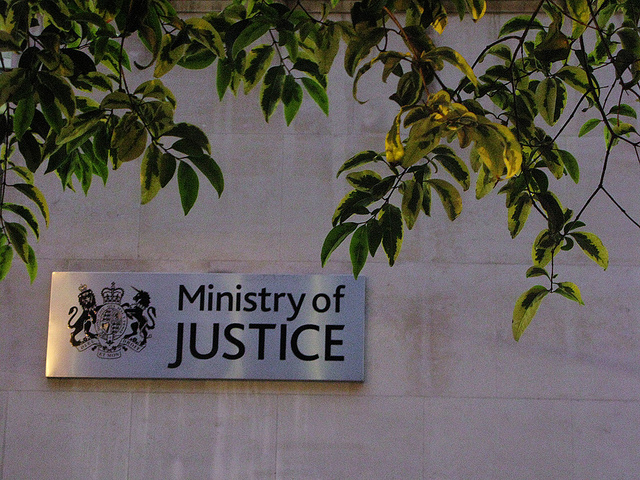The reform of judicial review is now an ongoing state of affairs rather than a one-off event
The government’s proposed reforms of judicial review have been criticised by campaigners and the legal profession. In this post, Mark Elliott examines how the government has changed direction in response to this criticism. He finds, however, that the refusal to reconsider changes to the “makes no difference” legal principle means that unlawful administrative actions by public bodies may be shielded from judicial review in the future.

The Ministry of Justice has faced criticism for its proposed reforms of judicial review. Credit: Holly (CC BY-NC 2.0)
Like the National Health Service, judicial review now appears to inhabit a world in which reform is an ongoing state of affairs, rather than a one-off event. The latest reforms have been announced by way of the Ministry of Justice’s response to the reactions it received to a consultation paper published in September 2013. Many of the proposals contained in the consultation paper—which I summarized in an earlier post on Public Law for Everyone—have either been refined or dropped. As Joshua Rozenberg has pointed out in The Guardian, the Ministry of Justice appears to have listened to criticism of those proposals—including from the judiciary itself, whose response to the consultation has now been published.
Thus, for instance, the proposal to transfer planning cases to the Upper Tribunal has been scrapped in favour of establishing a new Planning Court within the High Court; local authorities are not to be denied standing to challenge decisions concerning major infrastructure projects; and legal aid will remain available in respect of statutory judicial reviews brought by individuals at immediate risk of losing their homes. Meanwhile, wider proposals that would have acted as a major disincentive to the taking on of judicial-review cases under the legal aid scheme—by making payments conditional upon the granting of permission to seek judicial review—have been somewhat diluted, such that the Legal Aid Agency will now be able to make payments in “meritorious” cases that conclude prior to permission being granted.
Two further aspects of the Ministry of Justice’s response should also be mentioned.
Standing
First, the consultation paper contemplated substantial restrictions upon standing; without proposing a replacement standing test, the September consultation paper clearly envisaged that standing should be limited to those with a direct interest, so as to rule out challenges by individuals or groups not specifically affected by the decision in question. Contrary to a report earlier this week in The Times (£) (on which I briefly posted), the Ministry of Justice has now dropped its proposal to restrict standing. This is to be welcomed. As I have argued previously, and as the Bingham Centre for the Rule of Law pointed out in its response to the consultation, to restrict standing in the way originally envisaged would be to misconceive the purpose of judicial review—the objective of which transcends the protection of individual interests, and extends to the maintenance of government according to law in which the community as a whole has a strong and shared interest. As the Bingham Centre’s response (which I co-authored) put it:
The legal standards upheld via judicial review ultimately constitute not only rights enjoyed by individuals, but duties owed by government to the public. It does not necessarily follow that the law should recognise an actio popularis, such that anyone can institute judicial review proceedings against the government irrespective of whether they have any connection with the subject-matter of the claim. [But] the fact that a direct interest should sometimes be required does not mean that it should always be required.
However, while the dropping of the standing proposal is welcome for this reason, it is counterbalanced by what the Ministry of Justice describes as “a tough package of reform to financial provisions in respect of judicial review to deter weak claims from being brought or pursued”. That package includes requiring (by means of an amendment to the Senior Courts Act 1981 to be effected by clause 51 of the Criminal Justice and Courts Bill) parties to inform the court about the financing of the claim, so as to ensure that “non-parties who are, in practice, driving litigation should have to face a more proportionate amount of the risk”, and a stricter approach to determining whether, in the context of granting Protective Costs Orders, resolving the issues in question is in the “public interest”.
The “makes no (substantial) difference” principle
A second aspect of the latest proposals that warrant mention relates to the “makes no difference” principle. Here, the Ministry of Justice did not listen what the judiciary said in its response to the consultation. As presently drafted, clause 50 of the Criminal Justice and Courts Bill will insert new provisions into section 31 of the Senior Courts Act 1981 such that relief must be refused
if it appears to the court to be highly likely that the outcome for the applicant would not have been substantially different if the conduct complained of had not occurred. [Emphasis added]
Moreover, the Bill envisages that it will be possible—and sometimes obligatory—for the court to consider this point not at the substantive-hearing stage, but at the permission stage. Provisions to be inserted into the Senior Courts Act will permit the High Court—and require it, if the defendant makes a request—to consider whether the outcome would have been substantially different absent the impugned conduct, and will go on to say that the court must refuse to grant leave if it is highly likely that the outcome would not have been substantially different. This contrasts with the present position, whereby courts may refuse relief or refuse to grant leave if satisfied that it is inevitable that the outcome would have been no different.
This proposal is problematic for three reasons. First, the “makes no difference” principle presupposes that judicial review is orientated exclusively towards securing the lawfulness of outcomes, which in turn assumes that values such as legality and procedural fairness are to be conceived of purely in instrumental terms. This overlooks the argument that such values are inherently valuable because they serve to reflect the dignity of individuals affected by governmental decision-making, and that they serve as a necessary discipline upon that process.
Second, and more prosaically, the “makes no difference” principle may be very difficult to apply in practice. As the judiciary pointed out in its response to the consultation:
… in most cases … the decision whether a procedural flaw made a difference to the outcome cannot be taken without a full understanding of the facts. At permission stage the requisite full factual matrix is rarely before the court … [A]n obligation to focus further on the no difference principle at the permission stage would necessarily entail greater consideration of the facts, greater (early) work for defendants, and the prospect of dress rehearsal permission hearings … A lower threshold than inevitability for the application of the “no difference” principle envisages judges refusing relief where there has been a proved error of law and the decision under challenge might have been different absent that error. The propriety of a different outcome being forestalled by the court’s no difference ruling should be closely considered. From a practical perspective, a court only reach a decision on a lowered threshold as to whether an alleged procedural error made a difference by in depth and detailed consideration of the facts. Dress rehearsal permission hearings (with associated length and expense) would again be a very real prospect.
Third, and finally, there is a constitutional difficulty with the proposal. Nothing in the Bill suggests that unlawful administrative actions that cannot be successfully challenged due to the “makes no difference” principle (either because leave will be denied or relief withheld) will be rendered lawful. The effect of the proposal is not to alter the legal status of the unlawful measure, but merely to shield it from judicial review. In its response to the consultation, the Bingham Centre said that
turning a blind eye [to the unlawfulness of the decision] does not breathe legal life into [it]. Unlawful administrative action is unlawful because it lacks a valid legal basis, having been taken in a way that causes the decision-maker to exceed its statutory authority. The absence of a judicial remedy in respect of such administrative action does not render it valid: at best, it obscures its invalidity. … [Moreover,] withholding [relief] can only be of limited effect. Whether or not an unlawful decision is quashed, its unlawfulness entitles others to treat it as such and generally demands that other courts acknowledge the illegality through the medium of collateral challenge. The insulation from all legal challenge of decisions rendered unlawful by procedural defects considered … to be inconsequential would, in effect, require such decisions to benefit from a source of power different from the enabling statute. For a decision to be rendered lawful by the retrospective endorsement of the court, primary legislation would in our view be required. Whilst technically possible according to the doctrine of parliamentary sovereignty, such a step would be highly questionable from a separation-of-powers perspective since it would give courts power to authorise executive action in any area in certain circumstances (where in their view an illegality probably made no difference).
For these reasons, it is unfortunate that the Ministry of Justice did not pay closer attention to the concerns raised by judges and others about giving an enhanced role to the “makes no difference” principle. It is, however, mildly reassuring that the government was receptive to at least some of the criticisms that were rightly made of the original proposals.
—
Note: This post originally appeared on Public Law for Everyone. It represents the views of the author, and does not give the position of the LSE or Democratic Audit. Please read our comments policy before commenting. Shortlink for this post: buff.ly/1dtPJiX
—
 Dr Mark Elliott is Reader in Public Law at the Faculty of Law, University of Cambridge, and a Fellow of St Catharine’s College, He is also a Fellow of the Bingham Centre for the Rule of Law and co-convenor of a major Public Law Conference being held in Cambridge in 2014. His books include Public Law, Beatson, Matthews & Elliott’s Administrative Law and The Constitutional Foundations of Judicial Review. He tweets at @DrMarkElliott.
Dr Mark Elliott is Reader in Public Law at the Faculty of Law, University of Cambridge, and a Fellow of St Catharine’s College, He is also a Fellow of the Bingham Centre for the Rule of Law and co-convenor of a major Public Law Conference being held in Cambridge in 2014. His books include Public Law, Beatson, Matthews & Elliott’s Administrative Law and The Constitutional Foundations of Judicial Review. He tweets at @DrMarkElliott.
Inset image: Jonathunder (CC BY-SA 3.0)






 Democratic Audit's core funding is provided by the Joseph Rowntree Charitable Trust. Additional funding is provided by the London School of Economics.
Democratic Audit's core funding is provided by the Joseph Rowntree Charitable Trust. Additional funding is provided by the London School of Economics.
The reform of judicial review in the UK is now an ongoing state of affairs, rather than a one-off event https://t.co/AoJdDlbLMQ
The reform of judicial review is now an ongoing state of affairs rather than a one-off event https://t.co/wvbLoVlDQn